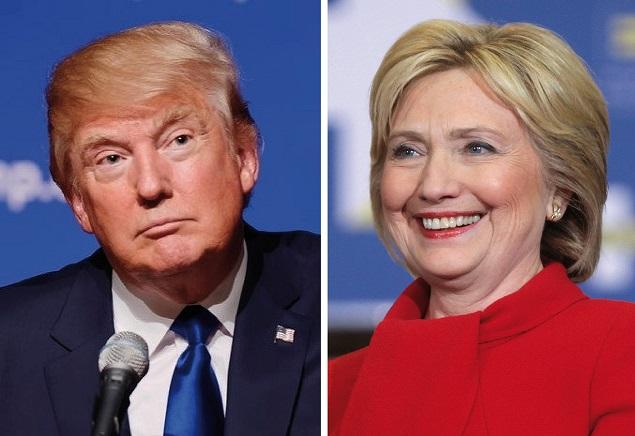The Presidential Race of 2016
Donald Trump (left) and Hillary Clinton (right) will go head-to-head in November for presidency.
August 24, 2016
The 2016 presidential race has been drawing on the hard lines that already existed between the Democratic and Republican parties.
The two candidates running for presidency are Hillary Clinton for Democrat Party and Donald Trump for the Republican Party. Hillary Clinton, a career politician and Chicago local, from Park Ridge and Donald Trump hailing from New York. Trump who is the main proprietor of some 13 or more Trump Towers including one here in Chicago.
Other candidates include Gary Johnson and Jill Stein. In January 2016, Johnson announced he intended to run for presidential election as a libertarian candidate. Some platforms for the libertarian party include individual freedom, social liberty, free market standards, and non-interventionist foreign policy, though they remain divided on abortion regulation.
Johnson, of North Dakota, identifies with the Republican Party and graduated with a degree in political science from the University of New Mexico in 1975. Johnson served as the governor of New Mexico for two consecutive terms, the first to serve two consecutive terms as governor in New Mexico.
Another Chicago-born candidate, Jill Stein, represents the Green Party with her running mate, Ajamu Baraka, a human rights activist. Stein graduated as magna cum laude from Harvard University, where she focused on psychology, sociology, and anthropology. Following her undergraduate career, Stein went on to receive her doctorate from Harvard Medical School in 1979. Stein practiced as a physician, rallied for environmental responsibility, green jobs, and education.
Where candidates stand on the issues:
On taxation: There are differences in how the Democratic and Republican Parties address the tax code in their respective party platforms.
The Democratic Party Platform references tax codes under the subtitle, “Making the Wealthy Pay Their Fair Share of Taxes” where they state, “Democrats will claw back tax breaks for companies that ship jobs overseas, eliminate tax breaks for big oil and gas companies, and crack down on inversions and other methods companies use to dodge tax responsibilities. We will make sure our tax code rewards good businesses that make investments and provide good-paying jobs here in the United States, not businesses that walk out on America.”
Under the Republican Party Platform, the current tax code is criticized. In reference to the current corporate tax rate it states, “A more damaging policy is hard to imagine.” In regards to international business and finance, republicans stated their intention to lower corporate taxes to “be on par with, or below, the rates of other industrial nations.” Both the Democratic and Republican parties indicate that they intend to promote transparency in financial matters both nationally and abroad.
On fair trade and technology: Republicans reference the world wide web in their platform under the segment titled “Building the Future: Technology.” Republicans call for “an international order that maintains a fair and open market for America’s goods and services.” The Republican Party promotes their aim to “advance policies that protect data privacy while fostering innovation and growth ensuring the flow of data across borders.” The Republican Party Platform elaborates on their agenda to “facilitate access to the spectrum by paving the way for high-speed, next generation broadband deployment and competition on the internet and for internet services.”
The Democratic Party Platform cites their aim to “significantly strengthen enforcement of existing trade rules and the tools we have, including by holding countries accountable on currency manipulation and significantly expanding enforcement resources.” In regards to international trade agreements and subsidies, the Democratic Party Platform states trade should “promote innovation of and access to lifesaving medicines. And it should protect a free and open internet.”
On Natural Resources, Public Health, and Energy: The Republican Party Platform makes it clear that they view the Democratic Party’s energy policy negatively. “The Democratic Party’s energy policy can be summed up in a slogan currently popular among its activists “keep it in the ground.” Solidifying their preference to expand mining and coal operations, the Republican Party Platform states “Keeping our energy in the earth will keep jobs out of reach of those who need them most.”
Surprisingly, both the Democrats and Republicans seem to be invested in ensuring that coal communities and their families are cared for, whether or not coal is destined to be a resource that the U.S. continues to rely on in the coming years.
The Democratic Party vows to fight climate change while not leaving any community behind “including the coal communities who kept America’s lights on for generations,” though the Democratic stance on the use of natural resources for energy varies drastically from the Republican consensus. The Democratic Party Platform cites intentions to “make new investments in energy-producing communities” and to “oppose threats to the public health of these communities from harmful and dangerous extraction practices, like mountaintop removal mining operations.”
Additionally, the Democratic Party Platform supports the EPA “under the Clean Water Act to establish proactively science-based restrictions on discharges of dredged or fill material associated with (metallic sulfide deposits),” while recognizing the “significant impacts” that agricultural practices can impose on national water, land, oceans, and the climate.”
While the actual election is only two months away, the presidential debate is scheduled for Sept. 26 and the vice-presidential debate for Oct. 4. The candidates will have further opportunities to discuss the hard lines that already separate them.








